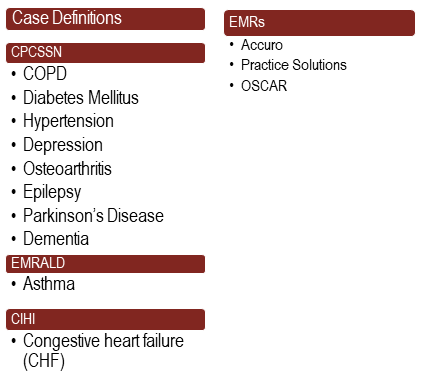AFHTO’s Algorithm Project was established in 2014 with a small group of QIDS Specialists interested in data mapping. The group quickly realized that there was a need to develop and test standard EMR queries to enhance the ability of all teams to extract and analyze EMR data, and to facilitate data clean-up initiatives. One year later the Algorithm Project team, composed mostly of volunteers, has established their mission to develop, test and deploy consistent queries based on the formally tested case definitions developed and published by CPCSSN and EMRALD. This work builds on the ALIVE project. The team’s goal is to improve access to clinical data through the development of standard queries for three major EMRs so that teams across the province can collect data on the chronic conditions as shown below. 
Goals of having consistent clinical data:
- Deliver consistent searches for multiple disease conditions across multiple EMRs
- Allow for easy and consistent identification of correct patients not previously identified
- Offer early treatment, hopefully mitigating disease progression
- Improve patient outcomes
- Reduce costs to the healthcare system
Results (learn more about the team’s methodology and the results here):
- COPD query: this query was developed in collaboration with the Ontario Lung Association (OLA) and the University of Toronto Practice Based Research Network (UTOPIAN)
- Diabetes query: this query was developed in collaboration with a number of FHT clinicians
- CHF query: this query was developed in collaboration with Cardiac Care Network and eHealth Center of Excellence
- Depression query: this query was developed in collaboration with St Michael's Hospital, Hamilton FHT and eHealth Center of Excellence
Currently working on
- Hypertension
- Queries on opioid use
Summary of impact:
The Algorithm Project team is a member-driven initiative, established by the QIDS Specialists in response to a need they identified within their teams. The spontaneous emergence of this group is an example of the positive impact of the ground-up approach to effective use of EMRs. Additionally, the team’s success illustrates the value of having the people using the technology bringing about the change. The standardized queries developed have shown that while EMR data quality issues have historically resulted in more emphasis being placed on data standardization efforts, it is possible to work with EMR data in its current state to get started on the QI journey.
-
Spread Beyond AFHTO
- Accuro has uploaded the COPD query and made it accessible to all users across the province via the Accuro Alerts Publisher
- The OLA has shared the COPD query with their network and continues to encourage all providers caring for patients with COPD to use this as a tool to identify patients with a diagnosis of COPD
- All Telus PS queries are available for download from the Telus Community Portal
- Query case definition criteria is being used for OntarioMD dashboard specifications
- Depression query is being used as the basis for the CAMH Optimum project to identify patients in the EMR with treatment-resistant depression
-
A ground-up approach works for getting started
- Through the development of standardized queries, customized to meet the needs of all teams, it is possible to extract reliable and meaningful data from the EMR without modifying functionality – teams are already doing this!
- Converting the diabetes case definition into a standard query, we now have teams creating more accurate diabetes registries – physicians are validating the lists, teams are coding their patients in a consistent way and updating their cohorts accordingly
-
Getting value out of EMR data starts with people
- Despite no change in EMR functionality, data standardization is increasing.
- Feasible solutions for extracting data and using it to improve have been developed and implemented through QIDS Specialists and the EMR CoPs
| NOTE: All queries are tested and validated prior to release. However, changes that take place after the queries are released may affect how accurate they are. Such changes could include EMR software updates, new medications, and changes to standard clinical definitions. They may result in false positives, that is, patients being flagged who do not have the specified condition. They may also result in false negatives, that is, patients not being flagged who do have the condition. Queries are also limited by the quality of your EMR data. Please exercise judgement when using them, as they are meant to support and complement a chart review, not to replace it. |
WHAT’S NEXT?
Members can see updates about the Algorithm Project team in our Members Only section here.
